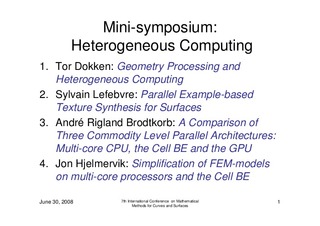| dc.description.abstract | As parallel computing resources have been too expensive for most of the CAGD community, efficient implementation of algorithms outside of High Performance Computing (HPC) has until a few years ago been following the sequential programming paradigm. Floating point operations in earlier processors lasted multiple clock cycles. Thus traditional implementations of, e.g., the Cox-de Boor algorithm are tailored to minimizing the amount of floating point operations. Current CPU chips have multiple processors cores (2, 4, 8, 12) each performing multiple floating point operations in a clock cycle. In addition graphical processor units (GPUs) have become programmable data stream processors having up to 480 processors. As most traditional algorithms have been developed withsequential computing in mind, the sequential nature is hard-coded into the algorithm. Accordingly systems for automatic parallelization of such algorithms can not be expected to be readily available. Thereforewe should readdress the algorithmic approach to CAGD challenges to find approaches that are better suited for multi-core and data stream processors. The talk will look at some experiments performed using GPUs as computational resources, and look into other CAGD challenges that could benefit from parallel algorithms. | |
